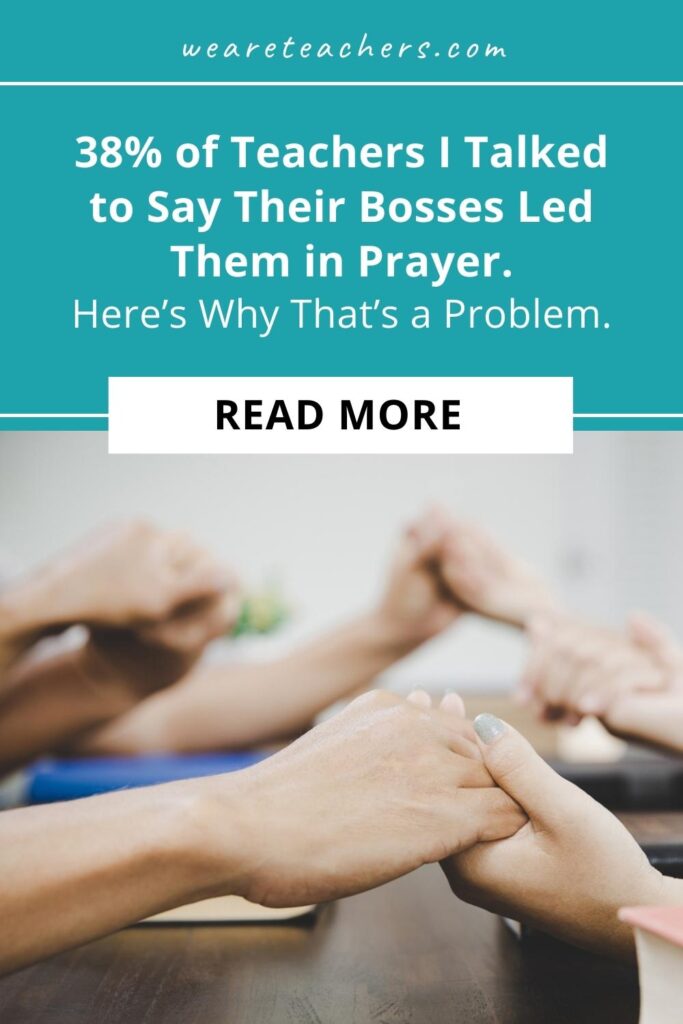Yesterday, I asked teachers on my Instagram Story if they’d ever been asked to pray at school on contract hours. I had at one of my first schools, and I was curious how common this was.
Over the next several hours, responses poured in from across the country. Some teachers—most in strong union states—couldn’t believe this is happening anywhere. Other teachers said that while this hasn’t happened to them, they could see it happening in schools in Texas or Florida. And other teachers confirmed what I suspected: that group prayer on contract hours is a normal practice in schools across the country. They told me about:
- Teachers with a Bible verse on their email signature.
- A basketball coach who would bench kids who chose not to pray with the team before games.
- A local pastor who led the district’s mandatory convocation in a church and encouraged teachers to “walk like Jesus” this school year.
- A post from a public school district’s official Facebook page promoting their back-to-school prayer walk.
- Principals, teachers, superintendents, and school board members leading whole-school or whole-district prayers on contract hours, or at school-sponsored events outside of school. Before graduation. Convocation. Staff breakfasts or lunches. Before sports games, UIL competitions, and musicals.
Of the nearly 1,500 responses from teachers, 38% said they’d been asked to pray on contract hours.
Though the number is on the decline, many Americans report that their religion is central to their lives. Still, the separation of church and state is clear that schools should be kept free of religious influence or endorsement from adults. Violations of church and state may be common, but it’s still a serious problem—one we cannot let schools get away with, no matter how well-meaning their leaders’ intentions are.
Let’s look at some of the key angles here.
The legal precedent
Many expressions of prayer are already protected in schools.
Staff and students have always been able to pray in schools privately and of their own volition. The Equal Access Act of 1984 ensures the First Amendment rights of students to meet voluntarily and during noninstructional times regardless of the “religious, political, philosophical, or other content of the speech at such meetings.” Student groups like Fellowship of Christian Athletes that meet outside of school hours are among the many protected expressions of religion in school.
Teachers, similarly, can meet with other teachers before or after school or during lunch to pray or express religious ideas with other teachers. As long as they are not in the presence of students, neglecting their duties as teachers, or infringing on the rights of their coworkers, they’re completely within their rights to pray at school.
The problem is when school officials lead group prayers on employees’ contract hours or during mandatory meetings. You may recall that the Establishment Clause of the First Amendment not only prohibits the government from establishing a religion, but also prohibits the government from favoring certain religions (and favoring religion over non-religion). As a result, schools and their officials are required to be neutral on religion while carrying out their duties.
In other words, while they’re on the clock or fulfilling a duty for school, school employees can’t demonstrate a preference for religion. And leading a group prayer certainly demonstrates that preference.
The harm
Schools are public. Religion is private (or at least it should be for Christians, according to Matthew 6:5-6).
When we pray out loud in front of a group on contract hours—no matter how friendly and welcoming we are, or even if we provide a disclaimer that you don’t have to participate—the message is still clear: The people holding the power in this school—representatives of government—endorse religion. It’s divisive and creates a clear boundary
But what’s the harm in mixing government and religion? Well, there’s a lot. It has a history connected to violence against children. But one reason is that our laws are subject to enough interpretation as it is—this is why we have judges, juries, and courts to facilitate the gray areas. Add in religion, which is highly vulnerable to radicalization and interpretation, and the gray areas become even more murky.
A thought experiment: If we have judges known to uphold government-sanctioned Christianity, what choice do they have but to offer forgiveness to every defendant? How would a religious justice system interpret defenses involving God’s will or God’s instruction? See what I mean? Murky.
A moral false equivalency
A common argument is that the United States declined in morality, safety, and other factors when we stopped praying in schools.
This argument forgets that America endorsed and protected 400 years of slavery while children prayed in schools. Virginia’s Act XII of 1662, the Trail of Tears between 1830 and 1850, the Sand Creek Massacre in 1864, the Wilmington Coup in 1898, Emmett Till’s murder in 1955—all of these American atrocities were committed by the hands of people who would have prayed in school as children.
Interestingly, Iceland—a nation that supports the separation of church and state—has the lowest crime rate of any developed nation and is the third happiest. They also have a higher percentage of believers than the United States.
The Founding Fathers and “a Christian nation”
Many point to the Founding Fathers’ intent to create a Christian nation as a reason for lowering the restrictions around prayer in school. A few things here:
- Just because something is old doesn’t mean it’s right. The Founding Fathers endorsed many practices that we later decided were illegal (slavery, rape of a minor, abuse of the mentally ill, etc.).
- Many of the Founding Fathers wouldn’t be recognized as Christians by modern standards. They rejected much of the fundamental doctrines of biblical Christianity, but believed that serving God engendered morality. This is key, though: They also believed that virtually all religions fulfilled that purpose, not just Christianity. This is why we have freedom of religion.
- The influence of two Founding Fathers (Jefferson and Madison) added the Establishment Clause, which, as we’ve explored, prohibits the government from favoring religion at all over non-religion.
To put it simply, the Founding Fathers promised both the freedom of religion and the freedom from religion. It’s futile to invoke the Founding Fathers for why we ought to demonstrate more religion in schools when all their public documents and private correspondences say otherwise.
Because religion is intensely personal, I understand why some people might see limiting the expression of it in public as an infringement of their rights, especially if this practice is normalized in their community. But in truth, separation of church and state is actually a protection of faith. It guarantees the government cannot dictate your religious beliefs—something we should all be able to unite behind as we see a Supreme Court continue to try.
How to report a violation of church and state:
If you’ve seen your district violate the separation of church and state, file a religious freedom complaint online with the U.S. Department of Health and Human Services. If you believe you’ve faced discrimination or retaliation for not participating in a religious expression, you can file a complaint with the U.S. Equal Employment Opportunity Commission.
You can also file a complaint with the organizations below:
Freedom From Religion Foundation
Americans United for the Separation of Church and State
Would a public school prayer be normal or bonkers in your area? Let us know in the comments.
Plus, for more articles like this, be sure to subscribe to our newsletters.

WeAreteachers

